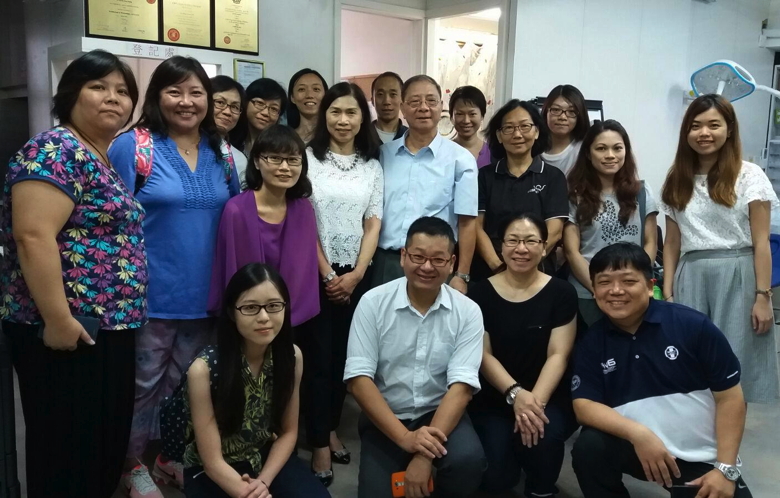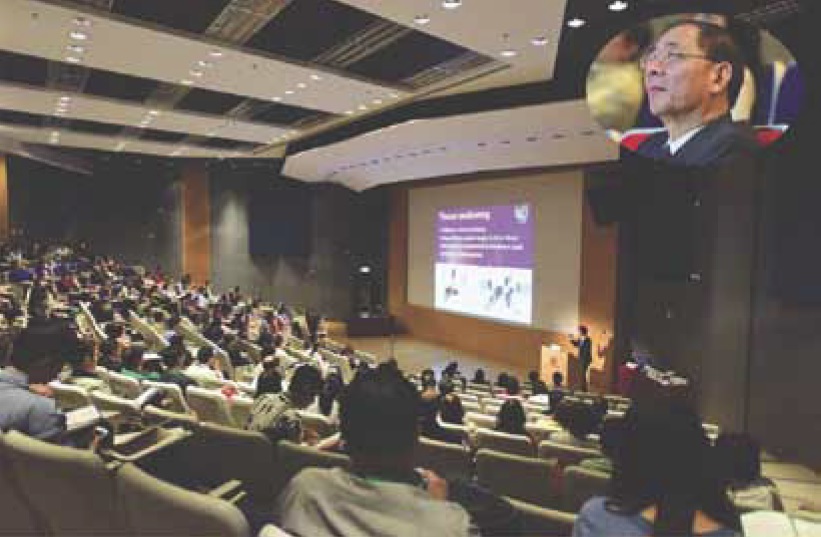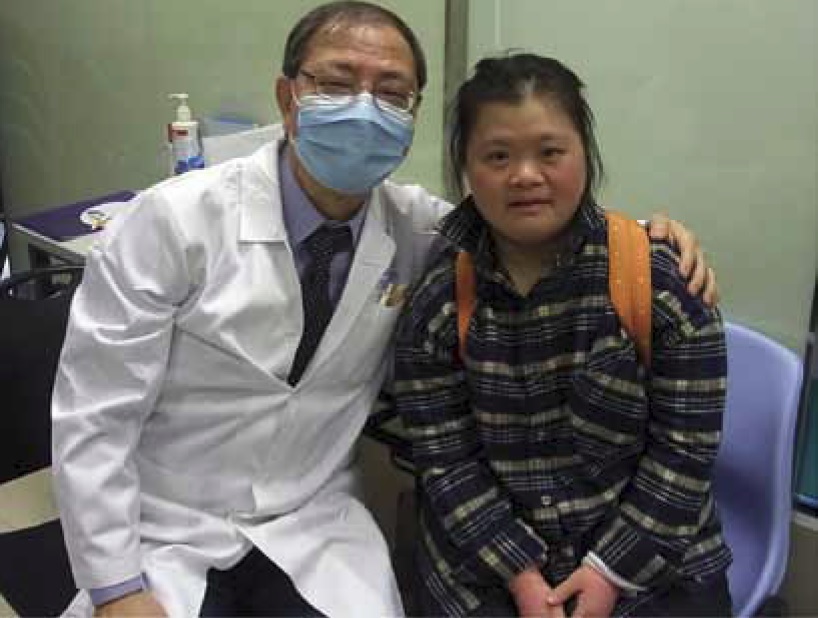© Hong Kong Academy of Medicine. CC BY-NC-ND 4.0
DOCTOR FOR SOCIETY
Dermatology, more than skin deep: Dr Nai-ming Luk and the Hong Kong Dermatology Foundation
Rex WH Hui; Alex QY Liu;
Andie CH Wu
Year 5, The University of Hong Kong

Dr Luk (centre, standing, blue shirt) at the geriatric dermatology teaching session for nurses and social workers
Since qualifying in Medicine from the Chinese
University of Hong Kong in 1987, Dr Nai-ming Luk
has devoted his career to the practice of dermatology
in the public sector and has been instrumental in the
development of dermatology in Hong Kong. After
his retirement in 2015, Dr Luk embarked on a new
project and established the Hong Kong Dermatology
Foundation (HKDF) of which he is Chairman.
The Hong Kong Dermatology
Foundation
Throughout his clinical career, Dr Luk has observed
how the general public consider skin conditions to be
insignificant and trivial. “While most skin conditions
are not life-threatening, they are highly visible and
can severely impact a patient’s quality of life.” In view
of this, Dr Luk set up the HKDF, where he utilises his
valuable clinical experience to work as a pioneer in
improving community dermatology care to enhance
both public and professional dermatology education
in Hong Kong.
Witnessing how the underprivileged are often
deprived of basic dermatology care, Dr Luk strives to
provide accessible dermatology consultations to such
patients. One of Dr Luk’s cardinal achievements is
the inception of the HKDF dermatology clinic. The
clinic is free-of-charge and has provided over 300
consultations in the first 6 months of operation. The
clinic is currently run twice per week and sees needy
or disabled patients who have been referred from
over 30 non-governmental organisations. “We are
really helping these patients with skin conditions that
will otherwise persist and affect many aspects of their
lives”, Dr Luk remarked as he pointed to the hand-written
thank you cards from grateful patients.
With the aim of enhancing professional
education in dermatology, Dr Luk has also organised
geriatric dermatology and dermatology courses for
nurses and social workers. He teaches the courses
that aim to “train the trainers”, such that his students
can develop and share skills with other colleagues
in their workplace and maximise the benefits of
his lectures. Another of Dr Luk’s brainchilds is the
Hong Kong Dermatology Symposium, the annual
flagship conference of the HKDF. The symposium
offers a platform for professionals to share their
knowledge and expertise and is well-attended by local
dermatologists, general practitioners, and nurses.
Other professional commitments
Outside of his work with the HKDF, Dr Luk has
multiple other professional commitments. He is
a medical consultant for the Hong Kong Down
Syndrome Association and has been actively
involved in pioneering collaborative work between
the Down Syndrome Association and the HKDF.
One key programme co-organised by Dr Luk was a
skin condition screening programme that took place
on 13 March 2016 for patients with Down syndrome.
A total of 62 patients were screened and 18 who
needed follow-up were referred to the HKDF clinic
for comprehensive and free dermatology care. Dr
Luk also holds an honorary clinical post at the Prince
of Wales Hospital where he attends a weekly grand
round and teaches junior dermatologists. Dr Luk is
also active in research and has recently published
on onychomycosis,1 one of the most prevalent skin
conditions in Hong Kong.
Future directions
Despite all his achievements and pioneering work, Dr
Luk has no thoughts of slowing down. Looking ahead,
he aims to further expand HKDF’s scope of service. He
hopes to arrange public education campaigns on skin
cancer, as the condition is frequently neglected by the
public and is shrouded in myths and misconceptions.
On a broader level, although HKDF provides a great
service to those in need of dermatology care, Dr
Luk believes the true solution lies in the system of
dermatology training and service—he believes that
more rigorous dermatology training should be offered
at an undergraduate level and major advancements
are needed to improve the current referral system
from primary care to dermatologists. As we enter
the era of telemedicine, Dr Luk sees the potential
of teledermatology, a developing subspecialty
in dermatology that utilises mobile devices and
digital images for distant clinical consultations. He
believes that one day, teledermatology will be able
to supplement traditional face-to-face consultations
and will be particularly beneficial for bed-bound
patients in hospitals or old-age homes, broadening
the reach of individual dermatologists.
“Medicine is a helping profession”
On a personal level, Dr Luk cherishes the satisfaction
of interacting with his patients and this joy keeps him
motivated in his daily work. Since his retirement Dr
Luk has turned down part-time clinical positions
in the public medical sector in favour of pursuing
his goals through voluntary work with the HKDF.
Finally, Dr Luk reiterates the importance of altruism
as a medical professional. “Medicine is a helping profession, your
satisfaction and happiness can only be gained through your patients, not by
money.”
Reference
1. Cheung YY, Lee SH, Hui M, Luk TN. Effect of pH on fungal growth: problems with using vinegar (5% acetic acid) in treating
superficial fungal infections. Hong Kong J Dermatol Venereol 2014;22:57-64.



